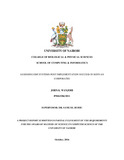| dc.description.abstract | Enterprise Resource Planning Systems have gained widespread usage among Kenyan corporates
and in order to achieve the many benefits ERP systems have to offers, an organization needs to
achieve ERP post implementation success, which must be continually reviewed to address any
emerging challenges. ERP systems implementations pose challenges to implementing
organizations and sometimes end up in failure. Any ERP initiative can be viewed as a strategic
investment adding value to the organizations’ IS infrastructure and it should therefore be
safeguarded. The problems associated with ERP implementations are most prevalent during the
post-implementation phase.
This study was carried out on the ERP post implementation phase of a local corporate in Kenya
and it sought to investigate factors that affect post implementation success of ERP systems,
investigate what management should put in place so as to achieve post implementation success
for ERP Systems and investigate the relationship between factors in the organisation’s contextual
environment and post implementation success of ERP Systems.
The research approach used were quantitative and qualitative. The study made use of
questionnaires, targeted interviews, focused group discussions and data from ERP project. From
the findings of the study, organizational, technological and environmental factors indirectly or
directly impact post implementation success. Management will be empowered to evaluate ERP
post implementation success of their organization based on the ERP experiences of the
organization in the study and adopt the findings to make improvements for future ERP projects.
Recommendations are drawn on probable ways to overcome existing ERP post implementation
challenges and also to improve on ERP post implementation success.
In conclusion, the study recommends increased investments towards hardware and software
upgrades, developing internal skilled expertise, firm policy on ERP usage, change management
and proper human resource management as necessary drivers towards achieving ERP post
implementation success. | en_US |



